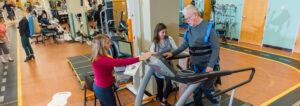What is a Case Manager’s Role in Health Care?

Back to physical health resource hub
Case managers are essential in today’s healthcare climate where improving patient outcomes, reducing readmissions and weighing the necessity of medical treatment are critical for effective care.
Brooks Rehabilitation employs case managers in many areas of its organization: our inpatient facilities, home health, skilled nursing and behavioral medicine services.
What does a case manager do?
Case managers coordinate the discharge plan and services with the patient, their family and the rehabilitation team to ensure that a patient has an appropriate care plan and services when they are discharged in order to continue their recovery process.
The case manager helps facilitate communication between clinical staff, loved ones and community agencies to ensure continuity of care and address any questions/concerns. They work closely with the doctors, therapists and nurses to make sure the follow-up services will be appropriate for each patient.
What does a typical day as a case manager look like?
During the day, case managers attend interdisciplinary meetings for several hours with patients and families to discuss rehab goals. After these meetings, the outcome and discussion is sent to third party payors to make determinations that patients are at the appropriate level of care.
In the interim, case managers are looking for services and resources that patients will need at discharge. They do a lot of networking and relationship building in the areas where patients are discharging to, which can be a large geographic area. Case managers also spend time educating staff, patients and families about options specific to care.
When does a case manager at Brooks get involved with patient care?
Every patient in Brooks Rehabilitation Hospital has a case manager. They begin working with them the day they are admitted to an inpatient facility. The goal at Brooks is to help patients achieve their highest level of recovery and participation in life. Our focus is always on helping them get home. That is why planning for discharge happens from the very first time a case manager meets with a patient and their family. We know that being in a rehab hospital is only a start in their recovery and we try to help patients and families understand what their long-term needs may be and help them prepare.


